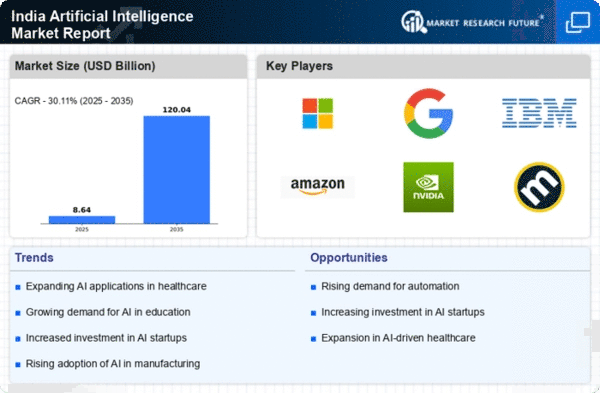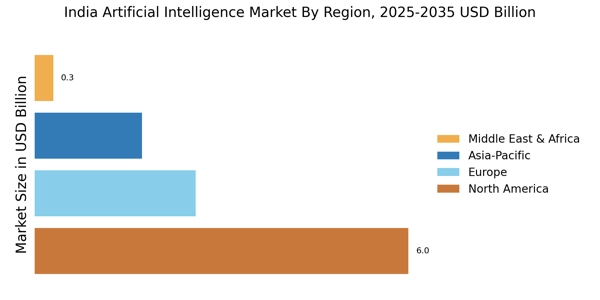Rising Demand for Automation
The increasing demand for automation across various sectors is a pivotal driver for the India Artificial Intelligence Market. Businesses are seeking to enhance operational efficiency and reduce costs, leading to a surge in AI adoption. According to recent estimates, the automation market in India is projected to reach USD 5 billion by 2025, indicating a robust growth trajectory. This trend is particularly evident in manufacturing, logistics, and customer service sectors, where AI technologies are being integrated to streamline processes. As organizations recognize the potential of AI to optimize workflows and improve productivity, the market is likely to witness accelerated growth. The convergence of AI with automation technologies is expected to create new opportunities, thereby reinforcing the significance of AI in driving business transformation.
Advancements in AI Technologies
Technological advancements in AI are driving innovation and growth within the India Artificial Intelligence Market. Breakthroughs in machine learning, natural language processing, and computer vision are enabling the development of sophisticated AI applications across various sectors. For instance, the integration of AI in healthcare is revolutionizing diagnostics and patient care, while in finance, AI algorithms are enhancing fraud detection and risk management. The continuous evolution of AI technologies is likely to attract investments and foster the emergence of new startups focused on AI solutions. As these technologies become more accessible and affordable, their adoption is expected to increase, thereby contributing to the overall growth of the AI market in India.
Government Initiatives and Support
Government initiatives play a crucial role in shaping the India Artificial Intelligence Market. The Indian government has launched several programs aimed at promoting AI research and development, including the National AI Strategy. This strategy emphasizes the importance of AI in various sectors such as healthcare, agriculture, and education. Furthermore, the government has allocated substantial funding to support AI startups and research institutions, fostering innovation and collaboration. As a result, the AI ecosystem in India is becoming increasingly vibrant, attracting both domestic and international investments. The government's commitment to creating a conducive environment for AI development is likely to propel the market forward, enhancing India's position as a key player in the global AI landscape.
Increased Focus on AI in Education
The growing emphasis on AI in education is emerging as a vital driver for the India Artificial Intelligence Market. Educational institutions are increasingly incorporating AI technologies to enhance learning experiences and improve administrative efficiency. AI-driven tools are being utilized for personalized learning, enabling educators to tailor content to individual student needs. Moreover, the Indian government has recognized the importance of AI in education, promoting initiatives that integrate AI into curricula. This focus on AI education is likely to cultivate a skilled workforce equipped to meet the demands of the evolving job market. As educational institutions continue to adopt AI technologies, the market is expected to expand, reflecting the increasing relevance of AI in shaping the future of education.
Growth of Data-Driven Decision Making
The proliferation of data and the growing emphasis on data-driven decision making are significant factors propelling the India Artificial Intelligence Market. Organizations are increasingly leveraging AI technologies to analyze vast amounts of data, enabling them to derive actionable insights and make informed decisions. The data analytics market in India is expected to reach USD 16 billion by 2025, reflecting the rising importance of data in business strategies. AI's ability to process and interpret complex datasets is transforming how companies operate, leading to improved customer experiences and enhanced operational efficiency. As businesses continue to recognize the value of data analytics powered by AI, the demand for AI solutions is anticipated to grow, further solidifying the market's expansion.

















